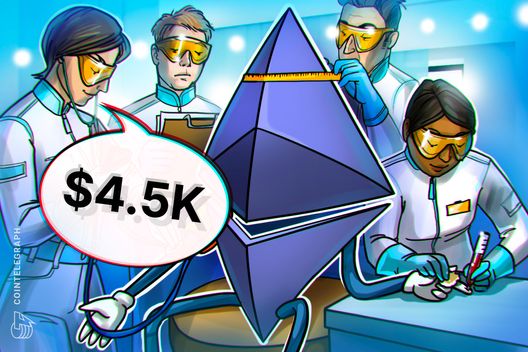
Alex Mashinsky bekannte sich im Dezember in zwei Fällen schuldig und gab vor Gericht zu, falsche Angaben zum Earn-Programm der Plattform gemacht zu haben.

Finanzmittel Info + Krypto + Geld + Gold
Krypto minen, NFT minten, Gold schürfen und Geld drucken

Alex Mashinsky bekannte sich im Dezember in zwei Fällen schuldig und gab vor Gericht zu, falsche Angaben zum Earn-Programm der Plattform gemacht zu haben.

Das Ausbleiben neuer Käufer, schwache Spot-Ethereum-Zuflüsse und rückläufige Netzwerkaktivitäten führen dazu, dass der ETH-Kurs auf 3.500 US-Dollar fallen könnte.

Der Deal mit Vine Hill Capital, der CoinShares mit 1,2 Milliarden Dollar bewertet, ermöglicht dem Unternehmen die Notierung an der US-Börse Nasdaq.
Flock token’s price rose from lows of $0.25 in early trading to hit highs near $0.69, gaining by over 150% as Coinbase and Upbit listed FLOCK on Base.
The gains left bulls targeting highs last seen in January when FLOCK reached its all-time high of $0.89.
However, profit taking has derailed this milestone as prices drop to lows of $0.47. Flock.io nonetheless still sports more 24-hour gains than LAUNCHCOIN and other top daily performers on the day.
FLOCK’s price rose as Coinbase added the decentralized AI platform’s native token to Coinbase DEX. The move ignited a price surge for FLock.io, with this happening within hours to see bulls propel from $0.25 to $0.69.
“Big news for DeFi traders! $FLOCK is officially listed on Coinbase DEX and Coinbase Markets. You can now transfer $FLOCK from Base and trade it on Coinbase. Another step forward for decentralized AI,” FLock.io posted on X.
Meanwhile, Coinbase also announced support for FLOCK on Base as it added trading support for SPX6900 (SPX) on the Ethereum network.
The exchange said transfers for the two assets will be available on Coinbase and Coinbase Exchange in the regions where it offers trading support, with trading set to go live on or after 9AM PT on September 9, 2025 subject to liquidity conditions being met.
SPX-USD and FLOCK-USD trading pairs are set to launch in phases, the exchange said.
Trading support for FLOCK on Coinbase saw the token’s trading volume spike amid heightened demand. Per CoinMarketCap, the daily volume for Flock jumped by more than 2,600% in 24 hours to over $339 million.
It’s a scenario that unfolded as South Korea’s leading exchange Upbit also announced the listing of FLOCK on Base.
This triggered further gains for the token, which rose more than 150%. Upbit’s support for FLOCK trading pairs in the Korean Won (KRW) market could add to a fresh surge in volume.
Congrats to our core partner @FlockAI on their KRW listing at Korea’s #1 exchange, Upbit! 🇰🇷
Flock runs a Federated Learning Model with real PMF—built on Base, operating exclusively on the Base network.We’ve been collaborating closely with founder @0x7SUN and APAC Head… https://t.co/SU5vyD1vCH pic.twitter.com/EZ8r6pTbr3
— Base Korea (@daehan_base) September 9, 2025
The dual listings have amplified FLOCK’s visibility and liquidity, likely positioning the project for fresh adoption. Focus on privacy-preserving federated learning and blockchain-based data sovereignty resonates with industries like healthcare and finance, where secure AI model training is key.
Flock’s gains come amid a robust initiative that has seen the FLock Foundation lock millions of FLOCK, helping the project’s long-term vision and growth.
“By locking for the max period, we’re showing our commitment to building lasting value alongside the FLock community,” Flock Foundation said.
Staking support and the latest rapid price spikes suggests FLOCK’s sustained growth could continue. Key price levels to watch include $0.40 and $0.70.
The post FLOCK token surges amid Coinbase and Upbit listings appeared first on CoinJournal.
Key takeaways
Digital asset manager Grayscale has filed with the U.S. SEC to convert its existing Chainlink Trust into a spot exchange-traded fund (ETF). According to the S-1 registration statement submitted to the regulator on Monday, Grayscale stated that if approved, the ETF would trade on NYSE Arca under the ticker GLNK.
The filing also includes a potential staking feature. If approved, the ETF would use third-party staking providers while keeping the LINK tokens in custodian wallets. Grayscale explained that the ETF could retain the staking rewards, distribute them to stakeholders, or sell them to cover expenses.
The LINK/USD 4-hour chart is bullish but inefficient, as altcoins have been rallying since the start of the week. LINK is currently trading above $23 and is now targeting its recent high.
The RSI of 63 shows that LINK is heading into the overbought territory, while the MACD lines are also within the bullish region. If the rally continues, LINK could hit the high of $27.94 recorded on August 22nd. However, LINK could temporarily dip to $22 to gain efficiency before rallying higher. An extended rally would see LINK test the $30 psychological mark over the coming days or weeks.

However, in the event of a market correction, LINK could retest the TLQ and support level at $21. Failure to hold this support level could see LINK drop below $20 for the first time in over four weeks.
The post Chainlink eyes $27 as ETF talks intensify; Check forecast appeared first on CoinJournal.